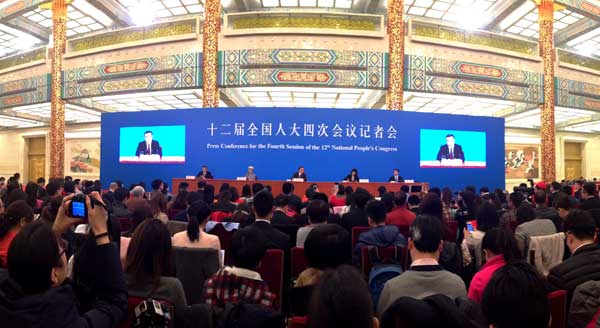China has policy tools to anchor economy, says Li
 0 Comment(s)
0 Comment(s) Print
Print E-mail China Daily, March 17, 2016
E-mail China Daily, March 17, 2016
|
|
|
Premier Li Keqiang holds a news conference in the Great Hall of the People in Beijing on Wednesday at the close of the annual session of the top legislature. [Xinhua] |
Highlights
Cross-Straits relations
Last year, I made a field trip to Fujian province, where I had a round-table (discussion) with some Taiwan businesspeople. Many of them were quite sensitive about any economic measures from the mainland and some were considering whether the preferential policy for Taiwan businesses would be changed. Their point was well taken, and we quickly issued a document specifying that all the preferential policies introduced for Taiwan businesses will remain unchanged, to reassure them. Why did we do that? Because we are all members of a big family. We will introduce more policies to boost business cooperation between the mainland and Taiwan on the premise that there will be continued peaceful development of cross-Straits relations, and the footstone of this is the 1992 Consensus.
Price of agricultural products
The average (grain) price in China is about 600 yuan ($92) per ton higher than the international price. This is mainly because our labor productivity is still quite low. So, in the future, we are going to pursue coordinated development between a new type of urbanization and agricultural modernization to help more migrant people move into urban areas. Those who are already working and living in urban areas will be granted urban residency if they meet certain eligibilities and requirements. And that is also one of the ways to boost their income. We will also develop scaled farming ... to boost labor productivity and enhance the competitiveness of our agricultural products. All in all, we will continue to give very high priority to all issues related to agriculture, farmers and rural areas. And we will also pay very high attention to protecting the lawful interests of workers in the industrial sector.
China-Japan-ROK leaders' meeting
This meeting should have been an annual event. However, it was only resumed last year after a three-year hiatus, and this did not come easily. As to whether the format will enjoy smooth development in the future, it's very much up to the interactions among the three countries. In particular, there have been some signs of improvement in Sino-Japanese ties, but they are not fully established yet and are still fragile. We believe that it is important to adhere to the consensus reached between the two sides on the issue of principle involving history, and it is important to match one's words with concrete actions.
Future of Hong Kong
The development of Hong Kong is needed by Hong Kong itself and also the country as a whole. Hong Kong's development ultimately comes down to the efforts made by the people in Hong Kong. As an advanced economy, Hong Kong achieved (GDP) growth of 2.4 percent last year, which is not low at all. Hong Kong can further use its own strength and also seize the opportunity offered by mainland development. The central government will give full support to any proposal from the SAR government that helps maintain Hong Kong's long-term stability and prosperity and contributes to the well-being of people in Hong Kong. I have confidence in a bright future for Hong Kong.
China-Russia ties
China-Russia relations will not be affected by changing circumstances in the international environment and will not cave in to third-party pressure. In the meantime, China follows the principle of nonalignment, and China-Russia cooperation will not be targeted at any third party.
Cultural relics protection
The preservation of cultural relics is (aimed at) boosting cultural development in our country, enhancing our moral strength and passing on our traditional culture. It will also help us achieve balanced economic and social development for the many problems that have occurred in our economic domain, such as cheating, swindling in the marketplace, selling fake goods, or loss of good faith. One may also try to find the causes behind those problems on a cultural level and make “cultural prescriptions”. The market economy is an economy on the basis of the rule of law with moral principles. So, developing culture will help us enhance moral strength in the course of pursuing modernization. We should not only work hard to create rich material wealth, but also meet our people's growing cultural needs and win the respect of other countries with the strength of culture and civilization.






